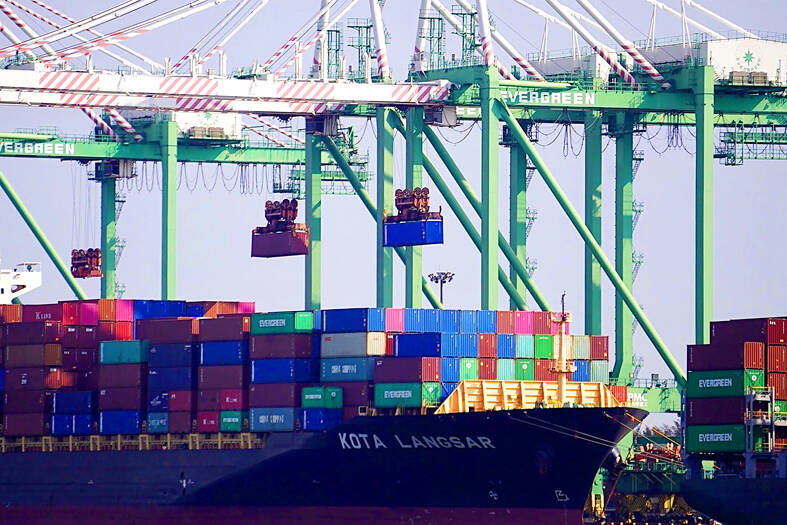Export orders dropped at the fastest pace in about three years at 6.3 percent annually to US$55.4 billion last month amid a deteriorating macroeconomy, the Ministry of Economic Affairs said yesterday.
The pace of decline topped the ministry’s expectation of an annual drop of 3.6 percent. On a monthly basis, orders fell 9.1 percent, the ministry said.
With external uncertainties — surging inflation, a global economic downturn and China’s “zero COVID” policy — continuing to weigh on demand, export orders are forecast to see a steeper decline of between 14.5 percent and 17.6 percent annually this month, the ministry said.

Photo: CNA
That would translate into orders of US$54 billion to US$56 billion and mark a third consecutive month of annual contraction, the ministry projected.
“There is a 50 percent chance that export orders for the full year would decline from last year,” Department of Statistics Director Huang Yu-ling (黃于玲) said by telephone.
“November’s performance is crucial. If the results come in closer to the high end of our forecast, there would be a smaller chance that they would dip into negative territory for the full year,” she said.
During the first 10 months of this year, export orders rose 4.4 percent annually to US$564.47 billion, ministry data showed.
Taiwan has not experienced a decline in annual export orders since 2019, when they shrank 5.3 percent, ministry data showed.
Last month, orders for electronics products expanded 9.6 percent annually to US$18.86 billion, driven by increasing demand for chips used in 5G-related applications, high-performance computing devices and automotive electronics.
RESTOCKING
Inventory restocking demand ahead of the year-end shopping sprees also helped, the ministry said.
On a monthly basis, orders for electronic goods slid 8.7 percent.
Orders for information and communications technology products edged down 0.3 percent annually and 9.4 percent monthly to US$18.45 billion, as demand weakened amid inventory adjustments in the supply chain, the ministry said.
Rising demand for newly launched smartphones and networking devices was offset by a decline in orders for notebook computers and graphic cards, it said.
Orders for optoelectronics, including flat-panel displays, dropped 43.4 percent annually and 13.2 percent monthly to US$1.47 billion last month due to sluggish demand for displays used in TVs and notebook computers, as well as lower average selling prices, the ministry said.
Base metal orders plunged 35.6 percent annually and 6 percent monthly to US$2.1 billion on the back of to weak demand for steel products, while orders for machine tools fell 25.3 percent annually and 12.5 percent monthly to US$1.69 billion, as manufacturers became more conservative about capital spending.
Inventory adjustments also caused orders for plastic products to plummet 38.3 percent annually and 8.5 percent monthly to US$1.62 billion, ministry data showed.
Petrochemical products also fell 31 percent annually and 9.5 percent monthly to US$1.51 billion, the data showed.

UNCERTAINTY: Innolux activated a stringent supply chain management mechanism, as it did during the COVID-19 pandemic, to ensure optimal inventory levels for customers Flat-panel display makers AUO Corp (友達) and Innolux Corp (群創) yesterday said that about 12 to 20 percent of their display business is at risk of potential US tariffs and that they would relocate production or shipment destinations to mitigate the levies’ effects. US tariffs would have a direct impact of US$200 million on AUO’s revenue, company chairman Paul Peng (彭雙浪) told reporters on the sidelines of the Touch Taiwan trade show in Taipei yesterday. That would make up about 12 percent of the company’s overall revenue. To cope with the tariff uncertainty, AUO plans to allocate its production to manufacturing facilities in

TAKING STOCK: A Taiwanese cookware firm in Vietnam urged customers to assess inventory or place orders early so shipments can reach the US while tariffs are paused Taiwanese businesses in Vietnam are exploring alternatives after the White House imposed a 46 percent import duty on Vietnamese goods, following US President Donald Trump’s announcement of “reciprocal” tariffs on the US’ trading partners. Lo Shih-liang (羅世良), chairman of Brico Industry Co (裕茂工業), a Taiwanese company that manufactures cast iron cookware and stove components in Vietnam, said that more than 40 percent of his business was tied to the US market, describing the constant US policy shifts as an emotional roller coaster. “I work during the day and stay up all night watching the news. I’ve been following US news until 3am

COLLABORATION: Given Taiwan’s key position in global supply chains, the US firm is discussing strategies with local partners and clients to deal with global uncertainties Advanced Micro Devices Inc (AMD) yesterday said it is meeting with local ecosystem partners, including Taiwan Semiconductor Manufacturing Co (TSMC, 台積電), to discuss strategies, including long-term manufacturing, to navigate uncertainties such as US tariffs, as Taiwan occupies an important position in global supply chains. AMD chief executive officer Lisa Su (蘇姿丰) told reporters that Taiwan is an important part of the chip designer’s ecosystem and she is discussing with partners and customers in Taiwan to forge strong collaborations on different areas during this critical period. AMD has just become the first artificial-intelligence (AI) server chip customer of TSMC to utilize its advanced

Six years ago, LVMH’s billionaire CEO Bernard Arnault and US President Donald Trump cut the blue ribbon on a factory in rural Texas that would make designer handbags for Louis Vuitton, one of the world’s best-known luxury brands. However, since the high-profile opening, the factory has faced a host of problems limiting production, 11 former Louis Vuitton employees said. The site has consistently ranked among the worst-performing for Louis Vuitton globally, “significantly” underperforming other facilities, said three former Louis Vuitton workers and a senior industry source, who cited internal rankings shared with staff. The plant’s problems — which have not